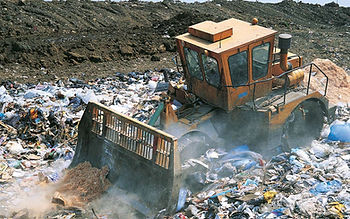Improper Waste Removal
- Mar 11, 2020
- 3 min read
As time goes on and culture develops, more people, families and businesses are becoming more sustainably minded.

As a result, waste removal becomes a key conversation, but also could be a growing concern.
Often, shortcuts are being taken in the process of waste removal and for it to actually have a beneficial impact on the wider environment, it needs to be done in the proper way.
Effects of Improper Waste Removal
Ruins sewage and drainage in local communities
North America recycles around 56 billion pounds of inedible meat by-products and used oil each year. The process of rendering allows companies to transform materials (which most people see as waste), into sustainable products which can be reused.
Used cooking oil specifically can be transformed into renewable biofuels. If this rendering isn’t done, destructive things can occur. It is dumped down sinks or drains, ruining sewage and drainage in local communities.
On top of this, cooking oil is often discarded and taken by a general waste management company. This results in the oil ending up in landfills with other trash – adding to the growing problem of land pollution in already existing landfills.
Some local governments however have a F.O.G (Fats, Oils, and Grease) program for proper removal of cooking oil.
Leads to ocean acidification
Waste and trash being dumped into the ocean has become a vast problem around the world.
In Mexico, for example, a smelly seaweed now washes up on the shore which is believed to be a result of climate change and ocean waste build up. This is threatening the tourism which the economy relies on in many areas of the country.
Additionally, another danger to improper waste removal is ocean acidification. The ever-increasing acidity in oceans has a huge impact on marine life.
Fish and other marine life can be highly sensitive to acidity and pH shifts. Even small changes can seriously affect populations. This can cause the fishing market to be affected as it relies on plentiful amounts of fish to sell as food.
Poor air quality
Most people would not think that air quality and waste management are linked, but this is not the case. If recycled items find their way to one of the many vast landfills, harmful gases can be emitted.
Typically, when paper, plastics, and other items end up in landfills, they are burned. These harmful gases emitted from the burning are disrupting the ozone layer and also contribute to methane gas, which is produced from waste as it decomposes. This is especially dangerous because as humans, this is the air we breathe day in and day out.
The methane gases emitted from decomposing waste can also cause unnatural shifts in weather – creating extreme heat and typhoons.
More care should also be exercised when disposing of containers containing liquids such as bleach or acids. If waste management is done well, and items are recycled and disposed of properly, the ozone layer is not threatened.
Contamination of soil
Soil contamination is often an overlooked issue and can be caused by improper waste removal. Soil is the lifeforce of all the food we consume. The soil has to be healthy and full of the right nutrients to support growth.
If improper waste disposal happens, hazardous chemicals from liquids and other recyclable goods will become embedded in the soil. The chemicals are then absorbed by the plants and passed along to who is eating the vegetables or fruit, whether humans or animals.
For more information, please contact Ben Hastings CertRP at Toro Recruitment.
Mob: 07854 306218
LinkedIn: http://bit.ly/BenHastings
Source: http://bit.ly/39LIg40





























Garbage waste removal must be done on proper basis so that your home will remain clean and hygiene. In my case, i have contacted car junk removal companies who helped me cleaning out the scrap from my garage.